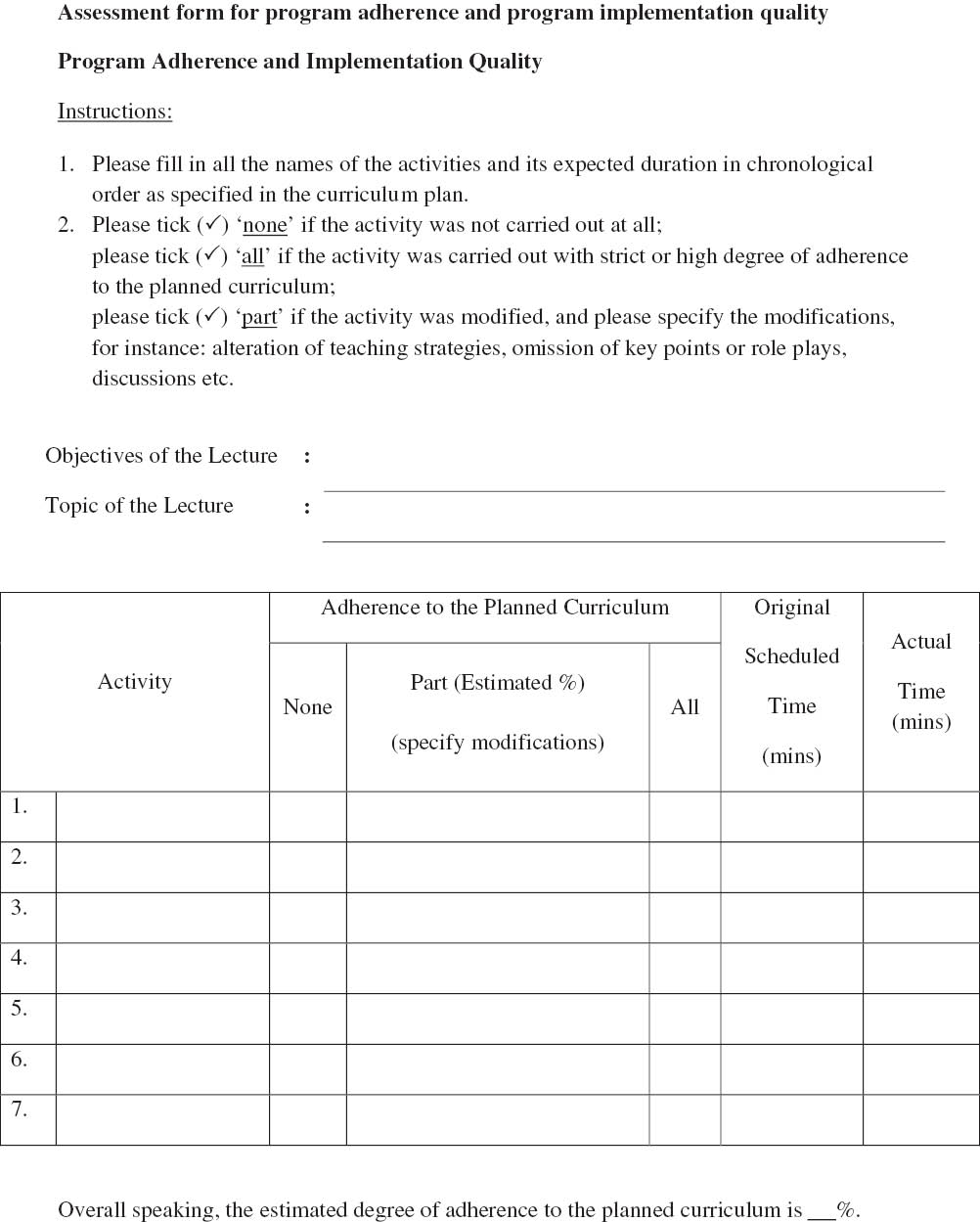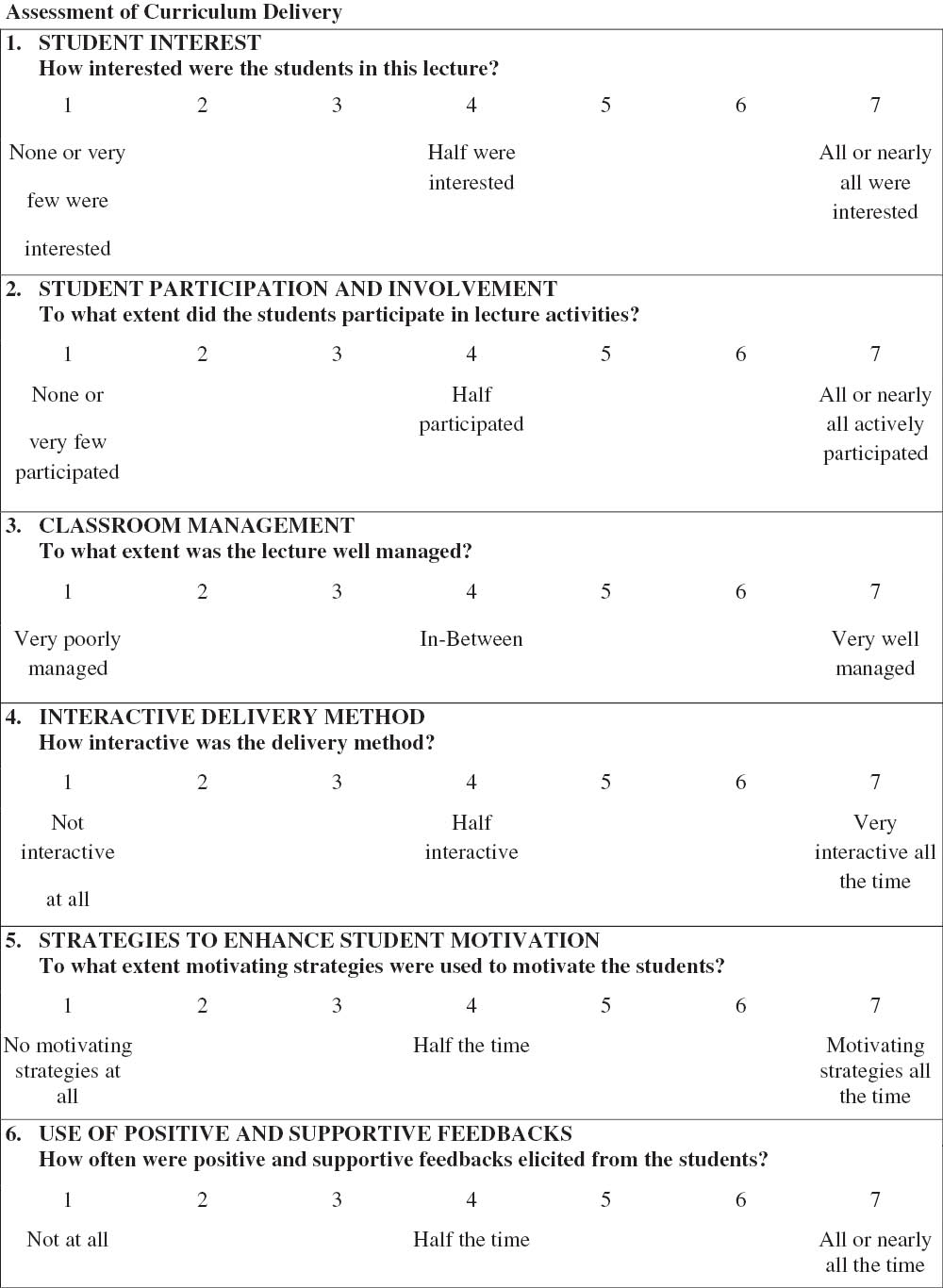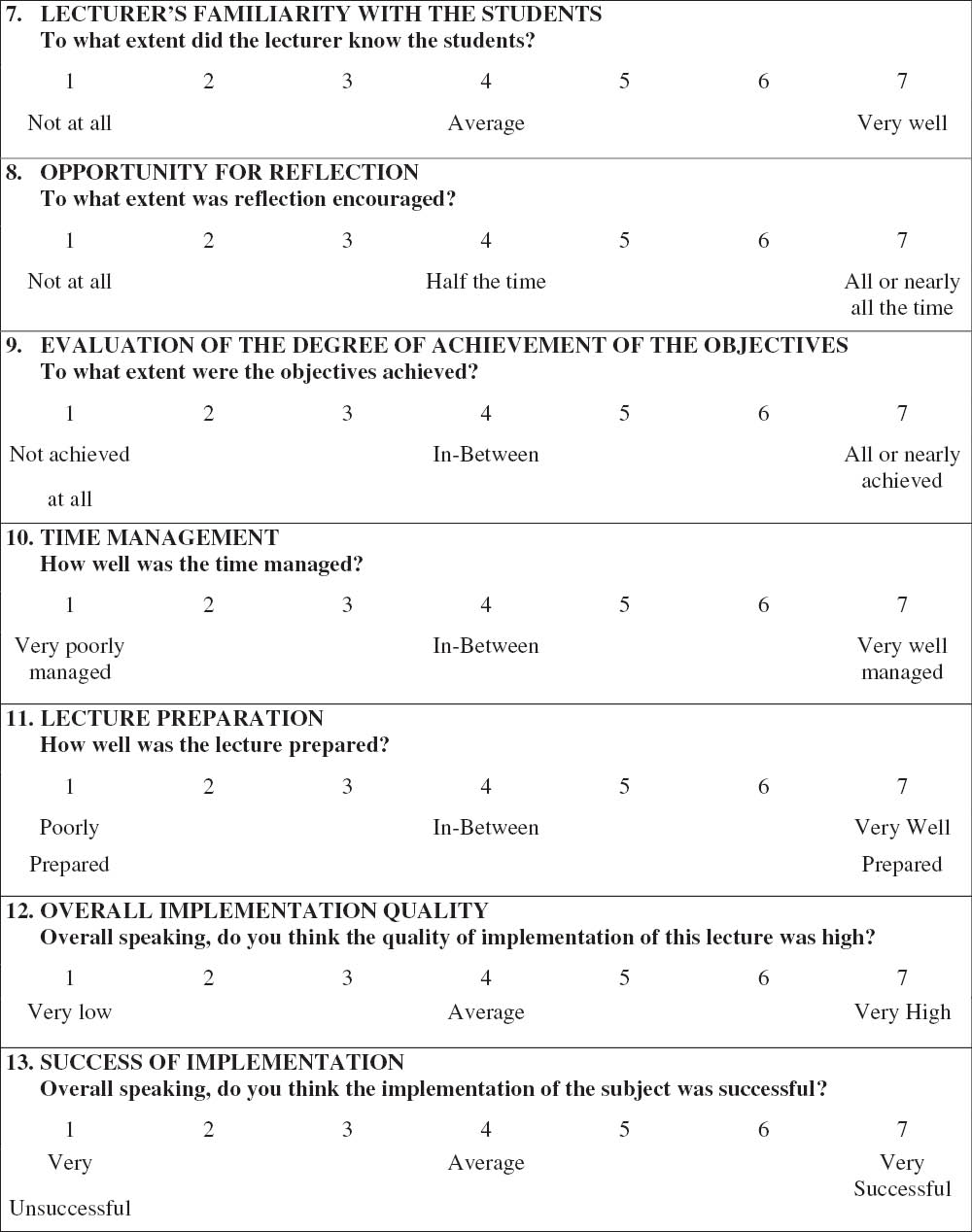Abstract
To promote the holistic development of university students under the knowledge economy, a subject entitled “Service Leadership” was developed and piloted at The Hong Kong Polytechnic University. Process evaluation was carried out for 10 lectures, with each lecture observed by two independent observers who were registered social workers. Inter-rater reliability across the two observers was high, suggesting the observations were reliable. Results showed that program adherence was high in these lectures (mean=97.8%) and ratings on the implementation quality of the subject were also high. Some of the qualities of program implementation were significant predictors of the overall quality and success of the program. Consistent with other findings, the present study suggests that the implementation quality of “Service Leadership” was high.
Appendix



References
1. Rogers EM. Diffusion of innovations, 4th ed. New York: Free Press, 1995.Suche in Google Scholar
2. Rohrbach LA, Graham JW, Hansen WB. Diffusion of a school-based substance abuse prevention program: predictors of program implementation. Prev Med 1993;22:237–60.10.1006/pmed.1993.1020Suche in Google Scholar
3. Dehar MA, Casswell S, Duignan P. Formative and process evaluation of health promotion and disease prevention programs. Evaluat Rev 1993;17:204–20.10.1177/0193841X9301700205Suche in Google Scholar
4. Saunders RP, Evans MH, Praphul J. Developing a process evaluation plan for assessing health promotion program implementation: a how to guide. Health Promot Pract 2005;6:134–47.10.1177/1524839904273387Suche in Google Scholar
5. Dane AV, Schneider BH. Program integrity in primary and early secondary prevention: are implementation effects out of control? Clin Psychol Rev 1998;18:23–45.10.1016/S0272-7358(97)00043-3Suche in Google Scholar
6. Durlak JA. Successful prevention programs for children and adolescents. New York: Plenum Publishing Corporation, 1997.10.1007/978-1-4899-0065-4Suche in Google Scholar
7. Dusenbury L, Brannigan R, Falco M, Hansen WB. A review of research on fidelity of implementation: implications for drug abuse prevention in school settings. Health Educ Res 2003;18:237–56.10.1093/her/18.2.237Suche in Google Scholar
8. Harachi TW, Abbott RD, Catalano RF, Haggerty KP, Fleming CB. Opening the black box: using process evaluation measures to assess implementation and theory building. Am J Community Psychol 1999;27:711–31.10.1023/A:1022194005511Suche in Google Scholar
9. Hornik R. Shedding some light on evaluation’s myths. Dev Commun Rep 1980;29:1–4.Suche in Google Scholar
10. Durlak JA, DuPre EP. Implementation matters: a review of research on the influence of implementation on program outcomes and the factors affecting implementation. Am J Commun Psychol 2008;41:327–50.10.1007/s10464-008-9165-0Suche in Google Scholar
11. Salmivalli C, Kaukiainen A, Voeten M. Anti-bullying intervention: implementation and outcome. Br J Educ Psychol 2005;75:465–87.10.1348/000709905X26011Suche in Google Scholar
12. Watson M, Battistich V, Solomon D. Enhancing students’ social and ethical development in schools: an intervention program and its effects. Int J Educ Res 1998;27:571–86.10.1016/S0883-0355(97)00055-4Suche in Google Scholar
13. Kam CM, Greenberg MT, Walls CT. Examining the role of implementation quality in school-based prevention using the PATHS curriculum. Prev Sci 2003;4:55–63.10.1023/A:1021786811186Suche in Google Scholar
14. Scheirer MA, Shediac MC, Cassady CE. Measuring the implementation of health promotion programs: the case of the Breast and Cervical Cancer Program in Maryland. Health Educ Res 1995;10:11–25.10.1093/her/10.1.11Suche in Google Scholar PubMed
15. Chen HT. A comprehensive typology for program evaluation. Eval Pract 1996;17:121–30.10.1177/109821409601700204Suche in Google Scholar
16. Baranowski T, Stables G. Process evaluations of the 5-a-day projects. Health Educ Behav 2000;27:157–66.10.1177/109019810002700202Suche in Google Scholar PubMed
17. Law BM, Shek DT. Process evaluation of a positive youth development program in Hong Kong based on different cohorts. ScientificWorldJournal 2012, Article ID 736730, 9 pages. DOI:10.1100/2012/736730.10.1100/2012/736730Suche in Google Scholar PubMed PubMed Central
18. Shek DT, Yu L, Ma CM, Sun RC, Liu TT. Development of a credit-bearing service leadership subject for university students in Hong Kong. Int J Adolesc Med Health 2013;25:353–61.10.1515/ijamh-2013-0033Suche in Google Scholar PubMed
19. Chung P. Hong Kong Institute of Service Leadership and Management Education. Available at: URL:http://hki-slam.org/index.php?r=article&catid=2&aid=16. Accessed on June 15, 2013.Suche in Google Scholar
20. Shek DT, Yu L, Ma CM. The students were happy, but did they change positively? Int J Disabil Human Dev 2014;13:505–11.10.1515/ijdhd-2014-0348Suche in Google Scholar
21. Shek DT, Lin L, Liu TT. Service leadership edcuation for university students in Hong Kong: Subjective outcome evaluation. Int J Disabil Human Dev 2014;13:513–21.Suche in Google Scholar
22. Shek DT, Lin L, Liu TT, Law MY. Service leadership edcuation for university students in Hong Kong: qualitative evaluation. Int J Disabil Human Dev 2014;13:523–9.Suche in Google Scholar
23. Shek DT, Sun RC. Process evaluation of a positive youth development course in a university setting in Hong Kong. Int J Disabil Human Dev 2012;11:235–41.Suche in Google Scholar
24. Shek DT, Sun RC. Process evaluation of a leadership and intrapersonal development subject for university students. Int J Disabil Human Dev 2013;12:203–11.10.1515/ijdhd-2013-0018Suche in Google Scholar
25. Shek DT, Ma HK, Lui JH, Lung DW. Process evaluation of the tier 1 program of the Project P.A.T.H.S.. ScientificWorldJournal 2006;6:300–9.Suche in Google Scholar
26. Rossi PH, Lipsey MW, Freeman HE. Evaluation: a systematic approach. Thousand Oaks, CA: Sage Publications, 2004.Suche in Google Scholar
27. Helitzer D, Yoon SJ, Wallerstein N. The role of process evaluation in the training of facilitators for an adolescent health education program. J School Health 2000;70:141–7.10.1111/j.1746-1561.2000.tb06460.xSuche in Google Scholar PubMed
©2014 by De Gruyter
Artikel in diesem Heft
- Frontmatter
- Editorial
- A tale of two innovative leadership subjects in Hong Kong, People’s Republic of China
- Review
- Teaching a subject on leadership and intrapersonal development: some personal reflections
- Original Articles
- Leadership and intra-personal development: relevance to Chinese nursing students
- Evaluation of a subject on leadership and intrapersonal development: views of the students based on qualitative evaluation
- Perceptions of a university subject on leadership and intrapersonal development: reflections of the scholarship recipients
- Do university students change after taking a subject on leadership and intrapersonal development?
- Post-course subjective outcome evaluation of a subject on leadership and intrapersonal development for university students in Hong Kong
- Post-lecture subjective outcome evaluation of a university subject on leadership and positive youth development in Hong Kong
- The role of teachers in youth development: reflections of students
- Perceived benefits of a university subject on leadership and intrapersonal development
- Effectiveness of a Chinese positive youth development program: the Project P.A.T.H.S. in Hong Kong
- The relationship between subjective outcome evaluation and objective outcome evaluation findings: evidence from China
- The students were happy, but did they change positively?
- Service leadership education for university students in Hong Kong: subjective outcome evaluation
- Service leadership education for university students in Hong Kong: qualitative evaluation
- Process evaluation of a pilot subject on service leadership for university students in Hong Kong
- Book Reviews
- European yearbook of disability law Mortsel
- Care of the adult with intellectual disability in primary care
Artikel in diesem Heft
- Frontmatter
- Editorial
- A tale of two innovative leadership subjects in Hong Kong, People’s Republic of China
- Review
- Teaching a subject on leadership and intrapersonal development: some personal reflections
- Original Articles
- Leadership and intra-personal development: relevance to Chinese nursing students
- Evaluation of a subject on leadership and intrapersonal development: views of the students based on qualitative evaluation
- Perceptions of a university subject on leadership and intrapersonal development: reflections of the scholarship recipients
- Do university students change after taking a subject on leadership and intrapersonal development?
- Post-course subjective outcome evaluation of a subject on leadership and intrapersonal development for university students in Hong Kong
- Post-lecture subjective outcome evaluation of a university subject on leadership and positive youth development in Hong Kong
- The role of teachers in youth development: reflections of students
- Perceived benefits of a university subject on leadership and intrapersonal development
- Effectiveness of a Chinese positive youth development program: the Project P.A.T.H.S. in Hong Kong
- The relationship between subjective outcome evaluation and objective outcome evaluation findings: evidence from China
- The students were happy, but did they change positively?
- Service leadership education for university students in Hong Kong: subjective outcome evaluation
- Service leadership education for university students in Hong Kong: qualitative evaluation
- Process evaluation of a pilot subject on service leadership for university students in Hong Kong
- Book Reviews
- European yearbook of disability law Mortsel
- Care of the adult with intellectual disability in primary care

